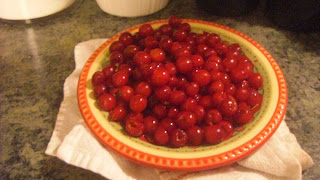Mrs. Teabody Lauds the "Loveliest of trees"
A Shropshire Lad II:
Loveliest of trees, the cherry now
Loveliest of trees, the cherry now
Is hung with bloom along the bough,
And stands about the woodland ride
Wearing white for Eastertide.
Now, of my threescore years and ten,
Twenty will not come again,
And take from seventy springs a score,
It only leaves me fifty more.
And since to look at things in bloom
Fifty springs are little room,
About the woodlands I will go
To see the cherry hung with snow.
”
from A.E. Housman, A Shropshire Lad (1896)
Good Morning, Gentle Reader on this second day of July in a summer of exceptional wetness and weediness and storms that send even the bravest of souls scurrying for cover. The gardens at Chez Teabody are serving as battlegrounds between what is planted, cultivated and desired and what is uninvited, aggressive and undesirable, and Mrs. Teabody's peace-keeping missions are ofttimes short-lived, sad to say. In spite of all this and the lack of blooms that days and days of overcast skies produces, there are victories enough in the garden: cone flowers as high as Mrs. Teabody's shoulders, a wisteria that is ever seeking new paths to conquer, and creeping Jenny that may soon serve as a new dining room carpet. Green things do, indeed, like the wet. But, as usual, this is not a little missive about the wet and the challenges of gardening in the wet. No. This is about one of summer's most brilliant and lively and flavorful fruits: the cherry.
Perhaps like Mrs. Teabody, you grew up during a time before the invention of the supermarket when the labors of summer produced almost the only fruits and vegetables one could enjoy during winter months. How many peas were shelled, beans snapped, corn shucked and silked to fill the jars that lined the shelves of the cellar? How many potatoes cut into pieces with at least one eye to plant in early spring to harvest in late summer to fill the bins to fill bellies that some days didn't have quite enough to fill them otherwise?All of these were important--fundamental to the diet of every rural person. However, summer preserving would have not held any attraction for Mrs. Teabody were it not for the rock stars of summer: fruit! Oh, the raspberries of June--all stained fingers and scratched arms, and just a few weeks before school went back into session after Labor Day, the peaches! Mrs. Teabody remembers baskets and baskets of them--small and slightly green and large and nearly crimson, peaches so juicy that there was no delicate means of attack and many a summer outfit bore the stains of peach juice until bedtime. Whoever has not charged recklessly teeth first into a fully-ripened summer peach has not known one of life's great gastronomical pleasures. And in between the raspberries of early summer and the peaches that signaled summer's end came -- for just the shortest of seasons - - the cherries.
A.E. Housman, who penned the poem above, knew a thing or several about cherries. And about life. Who has not gazed in wonder and thanksgiving at a cherry tree full of blossoms pink and white on an end-of-April, start of May day? Blossoms are a promise. A pact. One that Nature makes and keeps. As clearly as the scene outside the window on this July morning, Mrs. Teabody can see the two cherry trees which grew on her family farm laden with blossoms the night of her high school prom. The scent from the blossoms hung in the air with the same certainty of stars in the sky. A heady, coming-of-age moment that realized that change is the nature of Nature. The first hard rain would turn the beautiful blossoms to skeletons of themselves and then in another day, all evidence of that full-flowering moment would be gone. But. By the last week of June or first week of July, each blossom would have transformed itself into a cherry. A ladder would be placed against the tree to reach the lower limbs, pails would be swung, the tree allowed the bravest of the lot--brothers, to climb to the top whilst little girls stayed closer to the ground perched on a limb, reaching, gathering and pinging the ruby treasures into the waiting pail. In the magical time lapse of memory, everyone soon enough sat on the porch squeezing juice and seeds, making the cherries ready for jars that would --soon enough! -- be carried carefully to the cellar to stand on the shelves like the rock stars they were. Are.
Last Friday morning Lady Glass stopped by Tickle Your Fancy and in her hands she carried a basket of cherries -- the ones pictured above. And those cherries were better than rubies because in that basket was the present friendship as well as all the memories of more than sixty summers. And Mrs. Teabody is here to tell you this July morning that sixty remembered summers are not nearly enough. Not by a long shot. Enjoy this day. Enjoy every day.




As I have said many times, I love your "voice". This is a beautiful tribute to cherries........and to life......and a reminder that even one hundred 'remembered summers are not nearly enough'. Lovely words, Lin! Lovely memories.
ReplyDelete